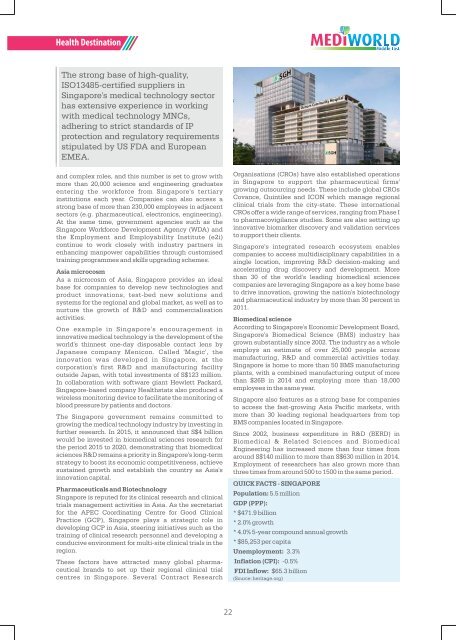Mediworld Mar-Apr Print File LW
You also want an ePaper? Increase the reach of your titles
YUMPU automatically turns print PDFs into web optimized ePapers that Google loves.
Health Destination<br />
The strong base of high-quality,<br />
ISO13485-certified suppliers in<br />
Singapore's medical technology sector<br />
has extensive experience in working<br />
with medical technology MNCs,<br />
adhering to strict standards of IP<br />
protection and regulatory requirements<br />
stipulated by US FDA and European<br />
EMEA.<br />
and complex roles, and this number is set to grow with<br />
more than 20,000 science and engineering graduates<br />
entering the workforce from Singapore's tertiary<br />
institutions each year. Companies can also access a<br />
strong base of more than 230,000 employees in adjacent<br />
sectors (e.g. pharmaceutical, electronics, engineering).<br />
At the same time, government agencies such as the<br />
Singapore Workforce Development Agency (WDA) and<br />
the Employment and Employability Institute (e2i)<br />
continue to work closely with industry partners in<br />
enhancing manpower capabilities through customised<br />
training programmes and skills upgrading schemes.<br />
Asia microcosm<br />
As a microcosm of Asia, Singapore provides an ideal<br />
base for companies to develop new technologies and<br />
product innovations, test-bed new solutions and<br />
systems for the regional and global market, as well as to<br />
nurture the growth of R&D and commercialisation<br />
activities.<br />
One example in Singapore's encouragement in<br />
innovative medical technology is the development of the<br />
world's thinnest one-day disposable contact lens by<br />
Japanese company Menicon. Called 'Magic', the<br />
innovation was developed in Singapore, at the<br />
corporation's first R&D and manufacturing facility<br />
outside Japan, with total investments of S$123 million.<br />
In collaboration with software giant Hewlett Packard,<br />
Singapore-based company Healthstats also produced a<br />
wireless monitoring device to facilitate the monitoring of<br />
blood pressure by patients and doctors.<br />
The Singapore government remains committed to<br />
growing the medical technology industry by investing in<br />
further research. In 2015, it announced that S$4 billion<br />
would be invested in biomedical sciences research for<br />
the period 2015 to 2020, demonstrating that biomedical<br />
sciences R&D remains a priority in Singapore's long-term<br />
strategy to boost its economic competitiveness, achieve<br />
sustained growth and establish the country as Asia's<br />
innovation capital.<br />
Pharmaceuticals and Biotechnology<br />
Singapore is reputed for its clinical research and clinical<br />
trials management activities in Asia. As the secretariat<br />
for the APEC Coordinating Centre for Good Clinical<br />
Practice (GCP), Singapore plays a strategic role in<br />
developing GCP in Asia, steering initiatives such as the<br />
training of clinical research personnel and developing a<br />
conducive environment for multi-site clinical trials in the<br />
region.<br />
These factors have attracted many global pharmaceutical<br />
brands to set up their regional clinical trial<br />
centres in Singapore. Several Contract Research<br />
Organisations (CROs) have also established operations<br />
in Singapore to support the pharmaceutical firms'<br />
growing outsourcing needs. These include global CROs<br />
Covance, Quintiles and ICON which manage regional<br />
clinical trials from the city-state. These international<br />
CROs offer a wide range of services, ranging from Phase I<br />
to pharmacovigilance studies. Some are also setting up<br />
innovative biomarker discovery and validation services<br />
to support their clients.<br />
Singapore's integrated research ecosystem enables<br />
companies to access multidisciplinary capabilities in a<br />
single location, improving R&D decision-making and<br />
accelerating drug discovery and development. More<br />
than 30 of the world's leading biomedical sciences<br />
companies are leveraging Singapore as a key home base<br />
to drive innovation, growing the nation's biotechnology<br />
and pharmaceutical industry by more than 30 percent in<br />
2011.<br />
Biomedical science<br />
According to Singapore's Economic Development Board,<br />
Singapore's Biomedical Science (BMS) industry has<br />
grown substantially since 2002. The industry as a whole<br />
employs an estimate of over 25,000 people across<br />
manufacturing, R&D and commercial activities today.<br />
Singapore is home to more than 50 BMS manufacturing<br />
plants, with a combined manufacturing output of more<br />
than $26B in 2014 and employing more than 18,000<br />
employees in the same year.<br />
Singapore also features as a strong base for companies<br />
to access the fast-growing Asia Pacific markets, with<br />
more than 30 leading regional headquarters from top<br />
BMS companies located in Singapore.<br />
Since 2002, business expenditure in R&D (BERD) in<br />
Biomedical & Related Sciences and Biomedical<br />
Engineering has increased more than four times from<br />
around S$140 million to more than S$630 million in 2014.<br />
Employment of researchers has also grown more than<br />
three times from around 500 to 1500 in the same period.<br />
QUICK FACTS - SINGAPORE<br />
Population: 5.5 million<br />
GDP (PPP):<br />
* $471.9 billion<br />
* 2.0% growth<br />
* 4.0% 5-year compound annual growth<br />
* $85,253 per capita<br />
Unemployment: 3.3%<br />
Inflation (CPI): -0.5%<br />
FDI Inflow: $65.3 billion<br />
(Source: heritage.org)<br />
22

















